6 key takeaways from CHG Healthcare’s 2023 State of Locum Tenens Report
CHG Healthcare recently released its State of Locum Tenens Report, an in-depth look at the current landscape of locum tenens and healthcare staffing. The 2023 report is compiled from physician surveys as well as internal data and resources and includes insights from physicians, healthcare facilities, and industry leaders.
As many as 50,000 providers — or 7% of the physician workforce — are currently working locums and nearly two-thirds of facilities utilize locum tenens physicians. To better understand views and perspectives surrounding this important segment of the healthcare staffing industry, here are six key takeaways from this year’s State of Locum Tenens report.
1. Medical facilities must promote better patient-to-provider ratios and provider wellness
Among healthcare facilities surveyed, 42% cited meeting rising patient demand among their reasons for hiring locum tenens (up from 30% in 2020) and 56% cited reducing existing staff burnout among the key benefits of locum support (up from 30% in 2020). These increases speak to the pandemic’s deep and abiding impact on healthcare providers and the need for greater work/life balance.
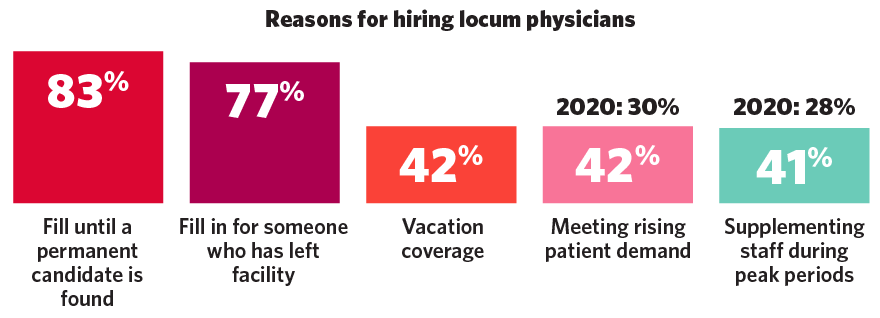
“Working locums is a great way for physicians to find better work/life balance for themselves by working where and when they want. Locums lets physicians bend their work around their life, in contrast to the years they spent bending their lives to fit around their education, training, and careers,” says Scott Beck, CEO, CHG Healthcare.
“While locum tenens can be a great solution for both facilities and physicians, it’s far from being the solution to everything healthcare is facing today. Unfortunately, very little is being done to systematically address physician burnout,” he continues. “There needs to be more focus on better patient-to-provider ratios and more focus on the wellness of all staff.”
“Health systems need to find actual ways to address physician burnout,” says Melinda Giese, senior vice president, CHG Healthcare. “This means doing more than providing free lunches or meditation spaces. They need to look at work environment, hours, and other issues that directly impact physician well-being.”
2. Attracting and retaining physicians is more complex and critical than ever
The report cites data from the Association of American Medical Colleges that shows current locums come from all age groups, with the largest segment coming from mid-career physicians (ages 45-54). While historically, most locums were tenured physicians using locums as a means to ease their transition to retirement, the trend toward younger locums suggests a new approach and mindset among emerging professionals.
“Physicians are becoming a lot more proactive about their careers. The newest physicians entering the workforce are smarter than ever in looking for particular cultures or compensation models and are acting with greater savvy in negotiation skills,” says Carey Goryl, CEO, Association for Advancing Physician and Provider Recruitment (AAPPR).
“Physicians at all levels want to be involved in decisions that impact them; they want to be supported to reduce administrative time and increase patient time; and they want career paths and opportunities for growth and mentoring. And unlike physicians of the past, if they don’t get these things, they will leave,” she continues.
“Staying out of loyalty is not as high of a value as it once was. To get ahead of this growing turnover trend, employers must address provider turnover with fresh, consistent, and measurable strategies with a sincere desire and willingness to make changes when the feedback directs it,” Goryl concludes.
3. Physicians and healthcare leaders alike have a positive impression of locum tenens
Physicians generally have a positive impression of and experience with locum tenens. CHG’s Locum Tenens Awareness & Perception Survey found 71% of physicians reported a very positive or somewhat positive impression of locums and 82% of physicians who have worked locum tenens report a very positive or somewhat positive experience.
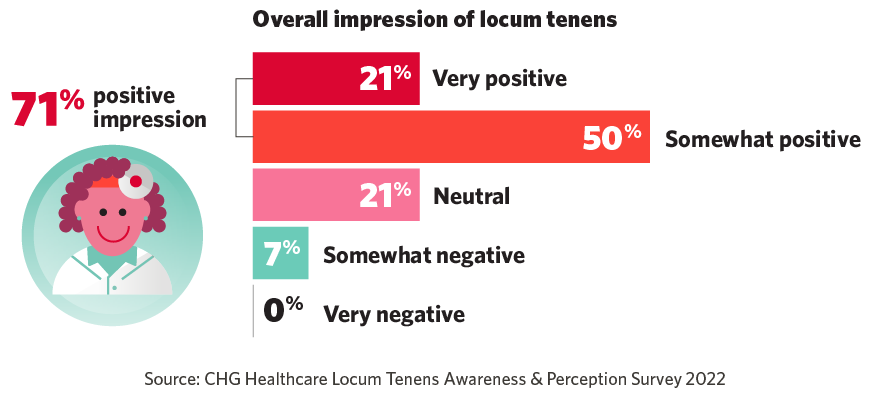
The opportunity for increased compensation is linked strongly to locums’ satisfaction. More than a quarter (27%) of physicians cited supplemental income as the primary motivation for initially pursuing and continuing locum tenens work, and 38% cite the more competitive compensation as the reason for their positive experience with locums.
Eleven percent of physicians report continuing to work locums to control their own schedules. “We’re seeing more and more young physicians who want better work-life balance and flexibility in their lives,” says Luke Woodyard, president of Weatherby Healthcare. “Being a physician used to be all about the work; now it’s about the work and the life outside of work.”
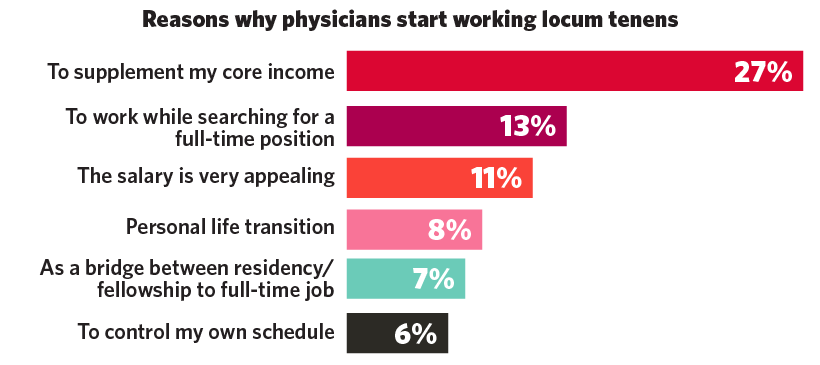
The survey also found that nearly half of healthcare recruiters and hospital leaders hold a positive or very positive impression of the locum tenens physicians who have worked at their facilities. And most staffing personnel report locums are generally well received and accepted among permanent staff.
4. Locum tenens utilization is at historically high levels
As many as 64% of healthcare facilities report using locum tenens, 35% of which use locums often or very often. It’s a figure with potential to grow, as half the facilities surveyed anticipate they will continue to use about the same amount of locum tenens and another third expect utilization to increase.
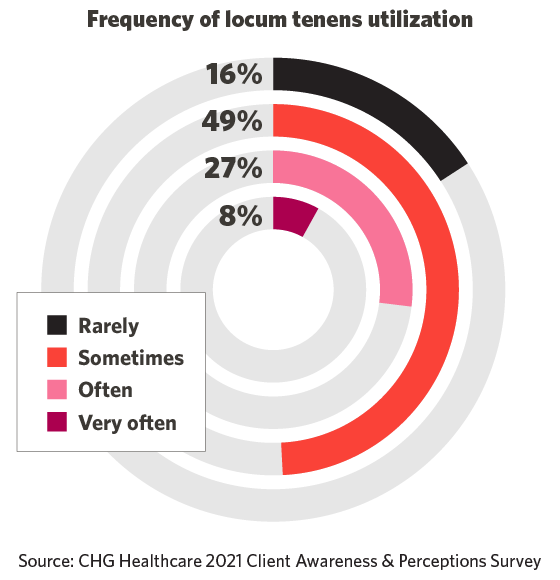
“Our system is big enough that we are able to offer our patients a wide variety of services. However, we’re small enough that if one or two people leave, we can feel a significant strain on staffing,” says Amy Powell, CPRP, director of medical staff recruitment, Reid Health. “Locum tenens lets us cover those gaps and keep offering our patients the care they expect.”
“We would love to be 100% employed with permanent staff, but it’s just not possible in the current state,” says Allison Spindle, MPS director of provider recruitment, Inova. “We are growing faster than we can bring on new people, so locums support allows us to keep up with that growth while still offering great patient care.”
5. There are benefits and drawbacks to hiring locum tenens physicians
Continuity of patient care is the prevailing motivation for facilities to hire locum tenens physicians. Nearly 70% of facilities who responded to CHG’s Client Awareness & Perceptions Survey said locums allows for the continual treatment of patients. Reducing burnout for existing staff (56%) and faster availability (50%) were other benefits often cited by healthcare facilities.
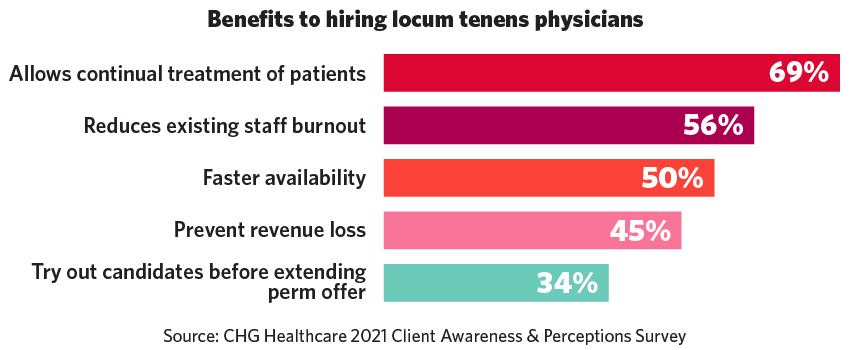
Facilities also weighed in on the drawbacks to locum tenens, most often pointing to the higher costs associated with locums relative to permanent physicians (82%).
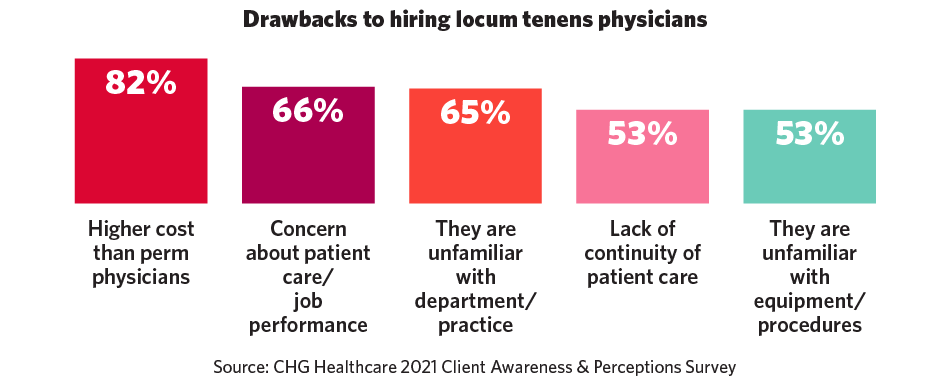
Giese urges facilities to adopt a strategic approach to staffing costs and consider the revenue streams that often go unclaimed.
“Locum tenens should be seen as a profit center rather than a cost center,” says Giese. “Simply cutting locums budgets may create short-term savings but is potentially leaving revenue on the table by not offering the services those locums could be providing.”
“When locums physicians are used and, even more importantly, billed for correctly, they can bring in as much as three times the revenue compared to what they cost,” says Giese. “Cutting locums to save money is in reality just costing you a lot more money.”
6. Oncology and psychiatry are in greater demand
In a four-year retrospective analysis, primary care remains the most utilized specialty for locums, followed by sub-specialties. Perhaps unsurprisingly, the need for pulmonologists and cardiologists steadily increased during the pandemic years.
The pandemic also gave rise to greater demand for locums oncologists and psychiatrists.

As the healthcare industry continues to face a clinician shortage — magnified by the effects of the pandemic — locum tenens will play an increasingly vital role in maintaining continuity of patient care, alleviating provider burnout, and supporting facilities’ profitability.



